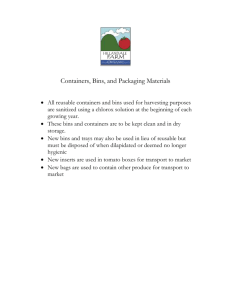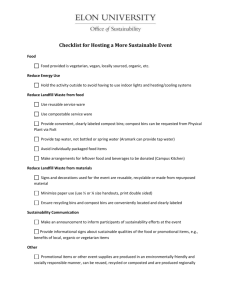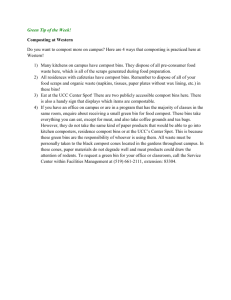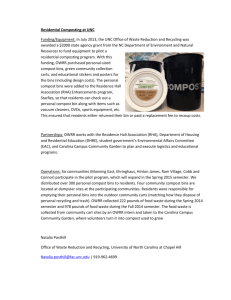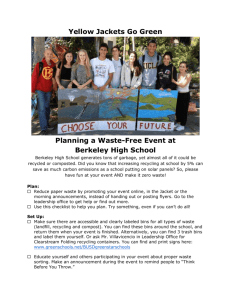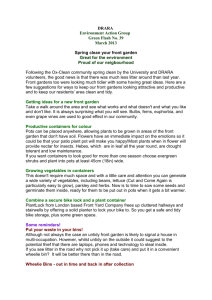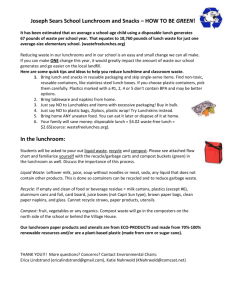PAPER COLLECTING
advertisement
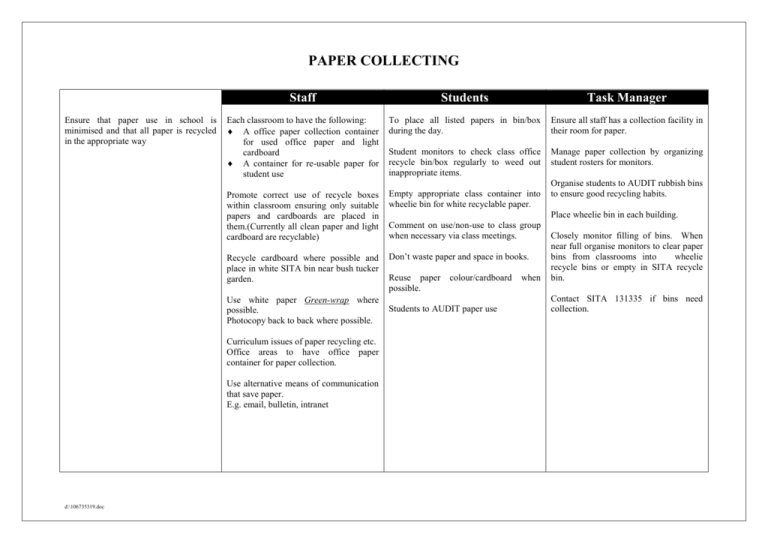
PAPER COLLECTING Ensure that paper use in school is minimised and that all paper is recycled in the appropriate way Staff Students Task Manager Each classroom to have the following: A office paper collection container for used office paper and light cardboard A container for re-usable paper for student use To place all listed papers in bin/box during the day. Ensure all staff has a collection facility in their room for paper. Student monitors to check class office recycle bin/box regularly to weed out inappropriate items. Manage paper collection by organizing student rosters for monitors. Promote correct use of recycle boxes within classroom ensuring only suitable papers and cardboards are placed in them.(Currently all clean paper and light cardboard are recyclable) Empty appropriate class container into wheelie bin for white recyclable paper. Recycle cardboard where possible and place in white SITA bin near bush tucker garden. Don’t waste paper and space in books. Use white paper Green-wrap where possible. Photocopy back to back where possible. Curriculum issues of paper recycling etc. Office areas to have office paper container for paper collection. Use alternative means of communication that save paper. E.g. email, bulletin, intranet d:\106735319.doc Organise students to AUDIT rubbish bins to ensure good recycling habits. Place wheelie bin in each building. Comment on use/non-use to class group when necessary via class meetings. Reuse paper possible. colour/cardboard Students to AUDIT paper use when Closely monitor filling of bins. When near full organise monitors to clear paper bins from classrooms into wheelie recycle bins or empty in SITA recycle bin. Contact SITA 131335 if bins need collection. ENERGY MANAGEMENT This school has an energy saving policy supported by DECS. Electricity is monitored and the school receives monthly accounts for payment. Staff Students Classroom teachers ensure that monitors are appointed to turn off electrical appliances and lighting when not in use and check that they carry out their duties. Monitors to check that all electrical appliances and lighting in classroom are turned off when not in use during the day. Ensure that when air conditioners are in use the doors are closed to maximise heating/cooling and minimise energy usage. Turn off electrical appliances and lighting after using shared area of the building. Task Manager To over-see effectiveness strategies. Staff responsible for turning off lights and heating/cooling in all areas of the school at the end of the week. ECO School: An ESD Approach has notes for teaching about Energy. Eg Greenhouse issues Agenda 21. View Video – “Saving Hieronyms”. Graph and display energy usage in EE display area. Use CENTA METERS to observe energy use.(located in IT Room and Resource Centre) Monitor the Solar energy produced by accessing intranet information. Model good practice for the school and community, ie assemblies, presentations, newsletters. Conduct surveys and carry out ENERGY AUDITS Report back to class and at school assemblies, newsletters etc. d:\106735319.doc smooth running and of energy savings Check energy saving in non teaching and storage areas of all buildings, eg hall, TV, activity room. Assist class monitors to keep records of energy usage. Encourage student monitoring and AUDITING across the school. Organise energy monitors to conduct random checks on electricity usage (awards for good practice/reminders – templates available). Give feedback of energy saving through account details (See bursar) STAFF KITCHEN Staff Ensure that the staffroom and kitchen is maintained in accordance with principles of our Eco School. egg energy compost (if in operation) kerbside recyclables plastics water Prepare a kitchen duty roster in staffroom for staff to fill in. Students All staff to register names on kitchen roster each term (equitably). Students to maintain courtyard area. Follow guidelines of roster carrying out kitchen duty. Bottle liquid fertilizer and distribute. when wormery in Supervise placement of containers on Friday pm. recycling Ensure roster is filled in equitably. Package worm castings for distribution Use the appropriate recycling containers: Compost (wormery in courtyard if in operation) kerbside plastics with recycle numbers Place cleaned: milk cartons (bricked) glass bottles/jars cardboard plastics with recycle numbers cans In recycling bin for collection during the week. Ensure that when air conditioners are in use the doors are closed to maximise heating/cooling and minimise energy usage. Staff are responsible for turning off lights and heating/cooling. Instant hot water system is to be turned off on weekend and holiday breaks Ensure that TRTs who are filling in for regular staff members understand staff duty routines. d:\106735319.doc Task Manager Ensure to empty compost daily. Make sure the hot boiler is turned off at weekends and holiday period. Assist children maintenance with wormery Place recycle bin on roadside for pickup.(evening before morning collection) COMPOST Composting is a difficult process to manage in a large school. Vermiculture kits are available for class use. Staff Students Provide compost container (with lid) for own class. Encourage daily use by students. Supervise emptying and cleaning of class container. Monitors from class to empty compost containers in shade house compost bins. Teachers to organise students emptying school bins and staffroom containers – all to be rostered. Groundsperson to maintain compost area. Clean compost containers when required. Classes empty school compost containers when required. Composting for school grounds. Classroom collection of food scraps Classroom scraps compost bins. placed in white Bins collected daily and emptied in compost area in shade house. To use a vermiculture (wormery) setup in your classroom /wet area as a term focus. Curriculum issues see Use of wormery boxes as classroom composting d:\106735319.doc EcoSchool: An ESD Approach has notes for teaching about Energy. Eg Greenhouse issues Agenda 21. View Video – “Saving Hieronyms”. Understand the purpose of composting, worms as recycler. Task Manager Oversee the composting process Encourage staff to have a turn with a school wormery. Liaise with ground-person to empty compost bin in shade house YARD CLEANING Staff All members of the school community have a responsibility to maintain a litter free school environment. Be responsible for their allocated area. Produce and display prominent sins concerning yard cleanliness Promote regular cleaning and assist their class to collect all rubbish when required. Promote use of bins – no littering. Report to assembly any special areas of concern or need. Students Task Manager Be personally responsible for all their own rubbish. If caught littering, they will be required to collect 20 pieces of litter and report to duty teacher. Inform all staff of their yard area and inservice new staff and contract teachers throughout the year. Clean their allocated area. Write reminders in the daybook for yard clean up when required. From time to time assess rubbish found and form action plane to deal with problems, eg recycle, reduce. Facilitate/publicise school wide litter-free lunches each term in conjunction with Student Council. Use the coloured recycle bins correctly. Call for extra yard cleans up when necessary. Promote use of recycling bins. Role model yard cleaning while on duty Provide tongs and gloves which are accessible for litter collection, at the discretion of the duty teacher. Promote yard cleaning at least once per term at assemblies and in school newsletters. d:\106735319.doc DRINK CONTAINERS To collect for recycling, 5 cent drink containers that are consumed in the school. To collect other plastic recyclables consumed in the school. E.g. Noodle containers, frozen juice container. Staff Students Task Manager Inform all their students of the drink containers that can be recycled, Remove straws, lids and place drink containers in appropriate coloured recycle wheelie bins at recess and lunch times. Organise monitors to sort recyclables and take to storage wheelie bins in the shade house. e.g.: fruit juice bottles plastic milk bottles ……and importantly items that are not recyclable. (glad-wraps etc) Explain to classes the removal of straw and rings off containers before being placed in collection containers. Identify collection containers and their location, eg colour wheelie bins. Provide a classroom collection container and a monitor to empty when needed Encourage reusable containers. Curriculum issues to be addressed when programming work. d:\106735319.doc Monitors to empty and check before being placed into recycling bales in shade house enclosure Contact Blackwood Recycling for pick up. Firewood and Promote the recycling of drink cartons regularly at assemblies and in school newsletter. DISPLAY BOARDS Display of ECO school information to the school community. Publishing and reporting of special events such as: Kids’ Congress Clean Up Australia Day World Environment Day Water Week Arbor Day, etc Staff Students Task Manager To supply task manager with relevant information, photographs, schoolwork related to ECO school topic. To report on ECO projects in varied writings, pictures, photographs. Coordinate displays and presentations for different events. Work collaboratively with other students to - produce information, ie buddy classes - produce work for these displays and presentations. Publicise in newsletters. Excursions could reflect the needs of ECO school. Be aware of special days of significance. Encourage students to present their work. Use a variety of mediums: Newsletter Intranet/Internet Pin up board Charts d:\106735319.doc SCHOOL LANDCARE Staff Students and parents have an active role in maintaining, caring and developing the school gardens and land in line with the school planting policy. To promote the good maintenance of our gardens. use and To use the shade house equipment to carry out landcare activities. To promote our schools’ environmental location in the hills community. Resources: Blooming ideas for Schools – Garden Projects for Upper Primary Students from the Australian Gardening Industry. To liaise with school grounds-man/ and or Principal if assistance is required for land-care projects d:\106735319.doc Students Task Manager Students are encouraged to participate in landcare projects and the safe use of gardening tools E.g. plant propagation, seed collecting, wormery etc. To coordinate the fostering of landcare areas in the school grounds. Students are to take an active role in the maintenance of the school gardens and grounds, eg weeding, mulching. Students appreciate the special environment in which our school is located. Interested students have the opportunity to participate in gardening in the school grounds. E.g. The Garden Club. Students and classes have ownership of a garden area in the school grounds. Reward classes for their active participation and accomplishments. Promote school landcare at assemblies and newsletters. Maintain, purchase equipment stored in the shade-house shed used for school land-care SPECIAL PROJECTS ROKEWOOD SCRUB/NATIONAL PARK Rokewood Scrub and National Park are valuable places for classes to visit and use as an integral part of the Eco School curriculum. Special events such as Cleanup Australia Day, World Environment Day, Arbor Day, and National Water Week can be important days to celebrate. BMAD forums are a way of our students being active in our school environment and are therefore an important part of student well being. Staff Students Task Manager To organise visits to these environmental places on a regular basis. Children will have the opportunity to take actions in the local environment. Publicise special projects and events that occur during the school year. To support their programs by using the National Park and Rokewood Scrub. Students will develop an enthusiasm for school and local environment. Coop a group to coordinate a special day or event. To be aware of special events during the year. Opportunities will exist for students to take leadership in special excursions and events, eg Kids’ Congress, Student Council. Liaise with the National Park when class groups visit. To link special projects and events to their yearly program. E.g. Biodiversity Month, Arbor Day, World Environment Day To use the variety of curriculum resources available to support your activities. d:\106735319.doc Students to produce information, task cards, signs that educate about Special Projects Students will have the opportunity to focus on individual interests. Such as Endangered Species, Flora, ecology studies. Supply information to staff and students. -need for inservicing of new staff -need for task cards, signs that explain roles of eco school management. These to be displayed. WATERCARE Students and staff have an active role in caring for water resources at Belair Schools. Staff Students Task Manager Inform students that water resources are important to save - South Australia’s water resources are vital for our future quality of life. To use water wisely in toilets, drinking and wash areas. To ensure water is used correctly in the school environment Conserve and plan the use of water in lessons. To record water usage by reading the water meter weekly, monthly, yearly and display in newsletter. Role model good use of water. Encourage students to be actively involved in water conservation in the school environment. Include Watercare in a variety of forms in the daily curriculum. Take note of media reports and issues relevant to our lives. E.g. Save the Murray, drought. Algae blooms etc Invite KESAB to the classroom to run Watercare activities. (see yearly program offered by KESAB) Inform students and parents of the Water-care initiatives used in our school through curriculum delivery. Do not leave taps running while drinking, washing art brushes and paints. E.g. use a buckets to wash things Dispose of water in an appropriate manner. E.g. sink or aquarium water can be emptied onto grass and plants Investigate the importance of water in our day to day lives through lessons Use drink containers if possible to fill with water on hot days Monitoring use in our school by reading the water meter. By being a KESAB Waterwatch monitor in our local creeks. Participation in Years 3-7. Conduct a water audit of school water conservation and use d:\106735319.doc To participate in Waterwatch training. TRANSPORT Use of safe transport practices that promote sensible environmental use in the community. Staff Students Task Manager Support the most suitable sustainable forms of transport systems for school excursions. Use the necessary safety equipment required for bicycles and skate boards. Coordinate groups from Travel Smart, Bike Education and Green Challenge. Include Travelsmart, Green Travel Challenge and Bike Education in classroom activities and lessons when appropriate Use car pooling if appropriate to attend workshops and training development. Encourage the use of the “Walking Bus” strategy for special days. d:\106735319.doc Walk safely to school using the correct safety procedures. Use the pedestrian lights correctly and follow the road monitors instructions. Participate in Bike Education sessions. Use the correct and safe equipment on special days. E.g. Wheel’s day, Skate day etc BELAIR SCHOOLS 2007 Reviewed January 2007 d:\106735319.doc
